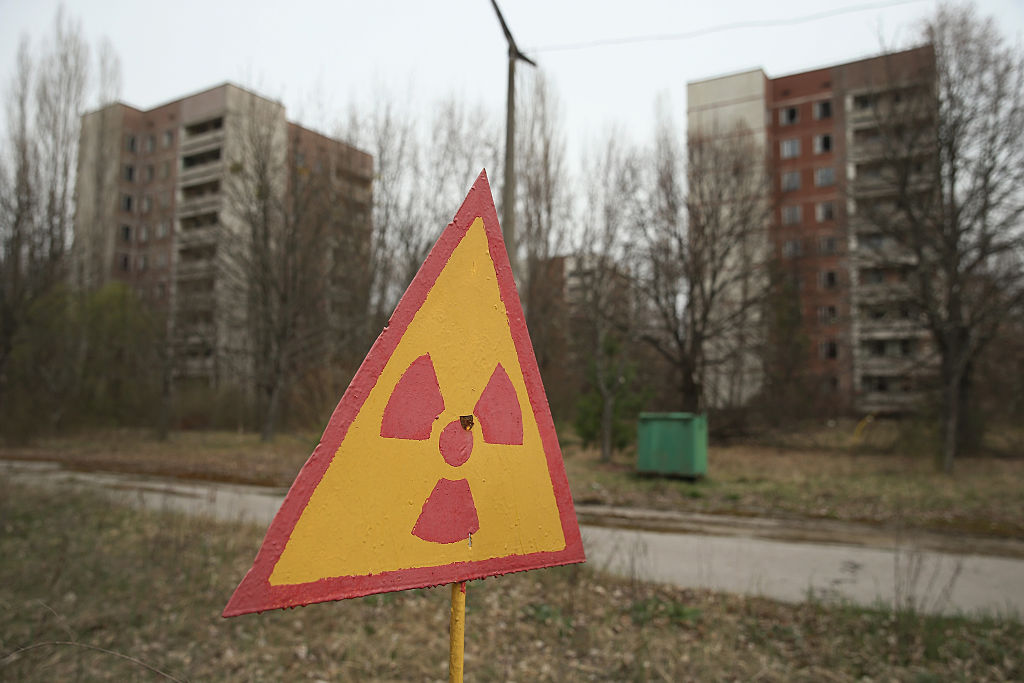Ukrainian officials demand cease-fire so repairs can be made at Chernobyl


A free daily email with the biggest news stories of the day – and the best features from TheWeek.com
You are now subscribed
Your newsletter sign-up was successful
Russian forces have disconnected the Chernobyl nuclear plant from Ukraine's power grid, the state-owned grid operator Ukrenergo said on Wednesday.
In 1986, Chernobyl was the site of the world's worst nuclear power plant accident; for days, radioactive substances were released into the air, with deposits falling across Europe. Chernobyl is closed, but the facility, which stores nuclear material, needs electricity so cooling, ventilation, and fire-extinguishing systems can operate.
In a statement on its Telegram page, Ukrenergo said "because of military actions of Russian occupiers," Chernoybl has been "fully disconnected" from the power grid and "has no power supply." On its Facebook page, Ukrenergo said emergency diesel generators have been turned on, but only have enough fuel to run for 48 hours, The Washington Post reports.
The Week
Escape your echo chamber. Get the facts behind the news, plus analysis from multiple perspectives.

Sign up for The Week's Free Newsletters
From our morning news briefing to a weekly Good News Newsletter, get the best of The Week delivered directly to your inbox.
From our morning news briefing to a weekly Good News Newsletter, get the best of The Week delivered directly to your inbox.
Ukrainian Foreign Minister Dmytro Kuleba tweeted that the "only electrical grid" supplying the Chernobyl plant "and all its nuclear facilities" has been damaged, and it's up to the "international community to urgently demand Russia to cease fire and allow repair units to restore power supply."
Once the emergency diesel generators run out of fuel, "cooling systems of the storage facility for spent nuclear fuel will stop, making radiation leaks imminent," Kuleba added. "[Russian President Vladimir] Putin's barbaric war puts entire Europe in danger."
The International Atomic Energy Agency (IAEA) tweeted that it does not see the power loss having a "critical impact on safety," as the volume of cooling water at Chernobyl is "sufficient for effective heat removal without need for electrical supply." Still, Russian forces have violated a "key safety pillar on ensuring uninterrupted power supply."
Since Russian forces seized Chernobyl late last month, the same 210 technical employees and guards have been working at the plant. IAEA Director General Mariano Grossi said Ukrainian authorities have told him it is "increasingly urgent" that these workers get rotated out to ensure "safe management" amid "worsening" conditions.
A free daily email with the biggest news stories of the day – and the best features from TheWeek.com
Catherine Garcia has worked as a senior writer at The Week since 2014. Her writing and reporting have appeared in Entertainment Weekly, The New York Times, Wirecutter, NBC News and "The Book of Jezebel," among others. She's a graduate of the University of Redlands and the Columbia University Graduate School of Journalism.
-
 Switzerland could vote to cap its population
Switzerland could vote to cap its populationUnder the Radar Swiss People’s Party proposes referendum on radical anti-immigration measure to limit residents to 10 million
-
 Political cartoons for February 15
Political cartoons for February 15Cartoons Sunday's political cartoons include political ventriloquism, Europe in the middle, and more
-
 The broken water companies failing England and Wales
The broken water companies failing England and WalesExplainer With rising bills, deteriorating river health and a lack of investment, regulators face an uphill battle to stabilise the industry
-
 What is ‘Arctic Sentry’ and will it deter Russia and China?
What is ‘Arctic Sentry’ and will it deter Russia and China?Today’s Big Question Nato considers joint operation and intelligence sharing in Arctic region, in face of Trump’s threats to seize Greenland for ‘protection’
-
 What would a UK deployment to Ukraine look like?
What would a UK deployment to Ukraine look like?Today's Big Question Security agreement commits British and French forces in event of ceasefire
-
 Would Europe defend Greenland from US aggression?
Would Europe defend Greenland from US aggression?Today’s Big Question ‘Mildness’ of EU pushback against Trump provocation ‘illustrates the bind Europe finds itself in’
-
 Did Trump just end the US-Europe alliance?
Did Trump just end the US-Europe alliance?Today's Big Question New US national security policy drops ‘grenade’ on Europe and should serve as ‘the mother of all wake-up calls’
-
 Is conscription the answer to Europe’s security woes?
Is conscription the answer to Europe’s security woes?Today's Big Question How best to boost troop numbers to deal with Russian threat is ‘prompting fierce and soul-searching debates’
-
 Trump peace deal: an offer Zelenskyy can’t refuse?
Trump peace deal: an offer Zelenskyy can’t refuse?Today’s Big Question ‘Unpalatable’ US plan may strengthen embattled Ukrainian president at home
-
 Vladimir Putin’s ‘nuclear tsunami’ missile
Vladimir Putin’s ‘nuclear tsunami’ missileThe Explainer Russian president has boasted that there is no way to intercept the new weapon
-
 The Baltic ‘bog belt’ plan to protect Europe from Russia
The Baltic ‘bog belt’ plan to protect Europe from RussiaUnder the Radar Reviving lost wetland on Nato’s eastern flank would fuse ‘two European priorities that increasingly compete for attention and funding: defence and climate’
